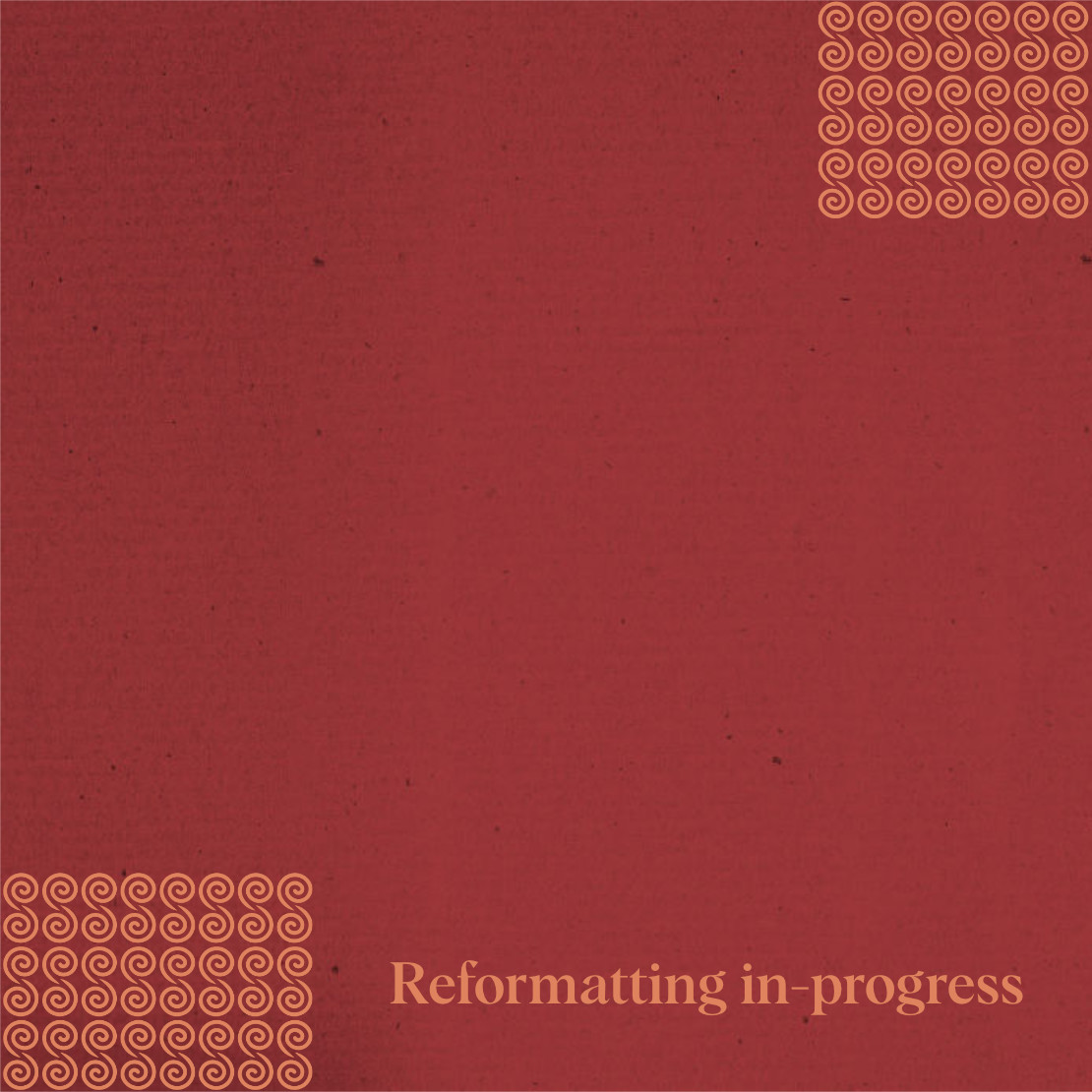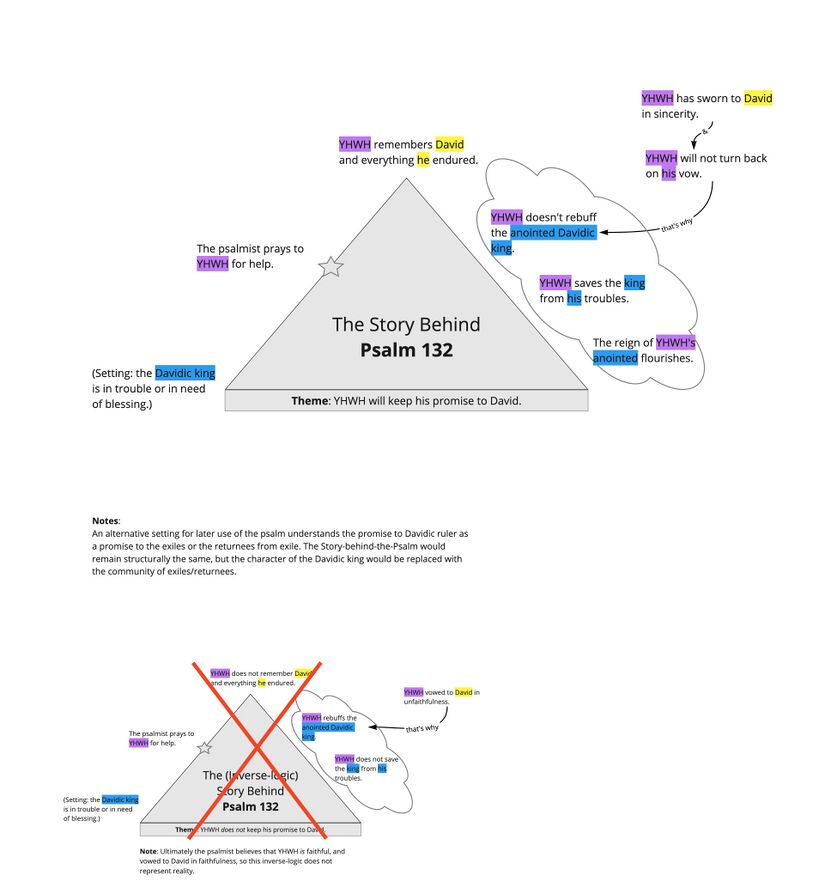Psalm 132 Story Behind
About the Story Behind Layer
The Story Behind the Psalm shows how each part of the psalm fits together into a single coherent whole. Whereas most semantic analysis focuses on discrete parts of a text such as the meaning of a word or phrase, Story Behind the Psalm considers the meaning of larger units of discourse, including the entire psalm.
The goal of this layer is to reconstruct and visualize a mental representation of the text as the earliest hearers/readers might have conceptualized it. We start by identifying the propositional content of each clause in the psalm, and then we identify relevant assumptions implied by each of the propositions. During this process, we also identify and analyze metaphorical language (“imagery”). Finally, we try to see how all of the propositions and assumptions fit together to form a coherent mental representation. The main tool we use for structuring the propositions and assumptions is a story triangle, which visualizes the rise and fall of tension within a semantic unit. Although story triangles are traditionally used to analyze stories in the literary sense of the word, we use them at this layer to analyze “stories” in the cognitive sense of the word—i.e., a story as a sequence of propositions and assumptions that has tension.
Summary Triangle
The story triangle below summarises the story of the whole psalm. We use the same colour scheme as in Participant Analysis. The star icon along the edge of the story-triangle indicates the point of the story in which the psalm itself (as a speech event) takes place. We also include a theme at the bottom of the story. The theme is the main message conveyed by the story-behind.
| Story Triangles legend | |
|---|---|
| Propositional content (verse number) | Propositional content, the base meaning of the clause, is indicated by bold black text. The verse number immediately follows the correlating proposition in black text inside parentheses. |
| Common-ground assumption | Common-ground assumptions[1] are indicated by gray text. |
| Local-ground assumption | Local-ground assumptions[2] are indicated by dark blue text. |
| Playground assumption | Playground assumptions[3] are indicated by light blue text. |
| The point of the story at which the psalm takes place (as a speech event) is indicated by a gray star. | |
| If applicable, the point of the story at which the psalm BEGINS to take place (as a speech event) is indicated with a light gray star. A gray arrow will travel from this star to the point at which the psalm ends, indicated by the darker gray star. | |
| A story that repeats is indicated by a circular arrow. This indicates a sequence of either habitual or iterative events. | |
| A story or event that does not happen or the psalmist does not wish to happen is indicated with a red X over the story triangle. | |
| Connections between propositions and/or assumptions are indicated by black arrows with small text indicating how the ideas are connected. | |
| Note: In the Summary triangle, highlight color scheme follows the colors of participant analysis. | |
Background ideas
Following are the common-ground assumptionsCommon-ground assumptions include information shared by the speaker and hearers. In our analysis, we mainly use this category for Biblical/Ancient Near Eastern background. which are the most helpful for making sense of the psalm.
- David's "afflictions" associated with bringing the ark to Jerusalem are known elsewhere in the Hebrew Bible (see 1 Kgs 2:26).
- "The place where YHWH chooses to make his name dwell" is a repeated motif in the book of Deuteronomy. God promised to reveal that place after he gave the Israelites victory over their enemies (Deut 12:10–11).
- The ark was moved from place to place before being located permanently in Jerusalem. It had been in Shiloh, then in the possession of the Philistines, then in Kiriath-jearim for 20 years (1 Sam 7:1–2; 1 Chron 13:5), and briefly in the care of Obed-edom (after Uzzah died from touching it; 2 Sam 6:1–12).
- The ark of the covenant was considered the footstool of God’s invisible throne. Bowing down toward it was a sign of reverence.
- Both "horn" and "lamp" are associated with kingship, especially God's promise to David. "Horn" emphasises royal authority, and "lamp" refers to the continuation of the dynasty.
Background situation
The background situation is the series of events leading up to the time in which the psalm is spoken. These are taken from the story triangle – whatever lies to the left of the star icon.

Expanded Paraphrase
The expanded paraphrase seeks to capture the implicit information within the text and make it explicit for readers today. It is based on the CBC translation and uses italic text to provide the most salient background information, presuppositions, entailments, and inferences.
| Expanded paraphrase legend | |
|---|---|
| Close but Clear (CBC) translation | The CBC, our close but clear translation of the Hebrew, is represented in bold text. |
| Assumptions | Assumptions which provide background information, presuppositions, entailments, and inferences are represented in italics. |
| Text (Hebrew) | Verse | Expanded Paraphrase |
|---|---|---|
| שִׁ֗יר הַֽמַּ֫עֲל֥וֹת זְכוֹר־יְהוָ֥ה לְדָוִ֑ד אֵ֝ת כָּל־עֻנּוֹתֽוֹ׃ | 1 | The Song of Ascents for worshippers going up to the temple in Jerusalem. Remember, YHWH, covenant God of Israel, for the sake of David, the king of Israel, who was in a special covenant relationship with you, everything that he endured as he fulfilled his promise to find a place for the temple of YHWH, |
| אֲשֶׁ֣ר נִ֭שְׁבַּע לַיהוָ֑ה נָ֝דַ֗ר לַאֲבִ֥יר יַעֲקֹֽב׃ | 2 | he who swore to YHWH (who) vowed to the Mighty One of Jacob: |
| אִם־אָ֭בֹא בְּאֹ֣הֶל בֵּיתִ֑י אִם־אֶ֝עֱלֶ֗ה עַל־עֶ֥רֶשׂ יְצוּעָֽי׃ | 3 | " I have a royal house, but YHWH doesn't yet have a sacred house. The ark has moved around from place to place for many years, and it's my responsibility as king to ensure that the royal city has a temple for my God. Therefore, I will not go into the dwelling place which is my house, thereby foregoing the royal luxuries I have won by defeating my political enemies, or go up onto the bed which is my couch, thereby foregoing psychological comfort, |
| אִם־אֶתֵּ֣ן שְׁנַ֣ת לְעֵינָ֑י לְֽעַפְעַפַּ֥י תְּנוּמָֽה׃ | 4 | or give sleep to my eyes or slumber to my eyelids, thereby foregoing the complete lack of physical or emotional exertion upon the completion of a task, |
| עַד־אֶמְצָ֣א מָ֭קוֹם לַיהוָ֑ה מִ֝שְׁכָּנ֗וֹת לַאֲבִ֥יר יַעֲקֹֽב׃ | 5 | before I find a special place for YHWH to take up residence with his people, a dwelling place for the Mighty One of Jacob in accordance with YHWH's promise to give us rest from our enemies and choose a place for his name to dwell." |
| הִנֵּֽה־שְׁמַֽעֲנ֥וּהָ בְאֶפְרָ֑תָה | 6 | Look! We the people of Israel heard about it, the ark, in Ephrathah David's hometown where he spoke of his plans to find its permanent home; we found it, the ark, in the fields of Jaar the place where the ark was kept for about twenty years after it was returned by the Philistines: |
| נָב֥וֹאָה לְמִשְׁכְּנוֹתָ֑יו נִ֝שְׁתַּחֲוֶ֗ה לַהֲדֹ֥ם רַגְלָֽיו׃ | 7 | When the Israelites celebrated the bringing of the ark to Zion, they said,"Let us go to his dwelling place which has now been established, let us bow down toward the ark, which is his footstool of his invisible throne in reverence to him! |
| קוּמָ֣ה יְ֭הוָה לִמְנוּחָתֶ֑ךָ אַ֝תָּ֗ה וַאֲר֥וֹן עֻזֶּֽךָ׃ | 8 | Set out, YHWH, to your permanent resting place in Zion, the City of David, you and your strong ark! |
| כֹּהֲנֶ֥יךָ יִלְבְּשׁוּ־צֶ֑דֶק וַחֲסִידֶ֥יךָ יְרַנֵּֽנוּ׃ | 9 | May your priests who minister in your resting place, the temple be clothed with righteousness, and may your faithful ones including the priests, but also all who have kept covenant with you sing for joy!" |
| בַּ֭עֲבוּר דָּוִ֣ד עַבְדֶּ֑ךָ אַל־תָּ֝שֵׁ֗ב פְּנֵ֣י מְשִׁיחֶֽךָ׃ | 10 | For the sake of David, who, by fulfilling his promise to find you a dwelling place has earned the right to be called your servant, do not rebuff your anointed one, the descendent of David who is in trouble. |
| נִשְׁבַּֽע־יְהוָ֨ה ׀ לְדָוִ֡ד אֱמֶת֮ לֹֽא־יָשׁ֪וּב מִ֫מֶּ֥נָּה מִפְּרִ֥י בִטְנְךָ֑ אָ֝שִׁ֗ית לְכִסֵּא־לָֽךְ׃ | 11 | YHWH swore to David (in) sincerity; he will not turn back from it, his oath: "(Someone) from your offspring, I will place on your throne to rule after you and continue your royalty dynasty. |
| וְעֵדֹתִ֥י ז֗וֹ אֲלַ֫מְּדֵ֥ם גַּם־בְּנֵיהֶ֥ם עֲדֵי־ע֑ד יֵ֝שְׁב֗וּ לְכִסֵּא־לָֽךְ׃ | 12 | If your descendants keep my covenant and my laws that I will teach them, then their descendants will also forever sit on your throne." The current Davidic king has kept YHWH's covenant, so if YHWH is faithful to his promise to David, then he will heed the call of the current king. |
| כִּֽי־בָחַ֣ר יְהוָ֣ה בְּצִיּ֑וֹן אִ֝וָּ֗הּ לְמוֹשָׁ֥ב לֽוֹ׃ | 13 | For YHWH had chosen Zion David's city; he had desired her as his dwelling place, as the place where he will put his name, as spoken of in Deuteronomy: |
| זֹאת־מְנוּחָתִ֥י עֲדֵי־ע֑ד | 14 | "This is my resting place forever; here I will dwell, because I have desired her. |
| צֵ֭ידָהּ בָּרֵ֣ךְ אֲבָרֵ֑ךְ | 15 | I will richly bless her provisions; her poor (people) I will satisfy with food since my presence brings blessing to those who honour me, as when Obed-edom cared for the ark. |
| וְֽ֭כֹהֲנֶיהָ אַלְבִּ֣ישׁ יֶ֑שַׁע | 16 | And her priests I will clothe with salvation, and her faithful ones who have kept covenant with me will sing exuberantly for joy, in fulfilment of Israel's blessing of the temple servants at the time the ark was brought to Jerusalem. |
| שָׁ֤ם אַצְמִ֣יחַ קֶ֣רֶן לְדָוִ֑ד עָרַ֥כְתִּי נֵ֝֗ר לִמְשִׁיחִֽי׃ | 17 | There I will cause a powerful horn of royal authority to grow for David; I have put in place a lamp of continued dynastic lineage for my anointed one, thereby ensuring that David's royal dynasty continues. |
| א֭וֹיְבָיו אַלְבִּ֣ישׁ בֹּ֑שֶׁת וְ֝עָלָ֗יו יָצִ֥יץ נִזְרֽוֹ׃ | 18 | His enemies I will clothe with shame because I will protect and defend the honour of my anointed king, but his crown of honour and glory will flourish on him, showing his legitimate royal authority." |
Story Triangles
There are currently no Imagery Tables available for this psalm.
Bibliography
Footnotes
- ↑ Common-ground assumptions include information shared by the speaker and hearers. In our analysis, we mainly use this category for Biblical/ANE background - beliefs and practices that were widespread at this time and place. This is the background information necessary for understanding propositions that do not readily make sense to those who are so far removed from the culture in which the proposition was originally expressed.
- ↑ Local-ground assumptions are those propositions which are necessarily true if the text is true. They include both presuppositions and entailments. Presuppositions are those implicit propositions which are assumed to be true by an explicit proposition. Entailments are those propositions which are necessarily true if a proposition is true.
- ↑ Whereas local-ground assumptions are inferences which are necessarily true if the text is true, play-ground assumptions are those inferences which might be true if the text is true.







